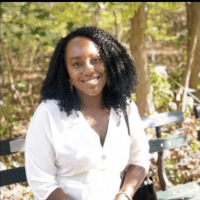Reimagining Access to Care in Uganda through Project-Based Collaboration

“The most valuable advice I have received from the Harvard Macy community is to build this with people who believe in the project.”
At just 25 years of age, Dr. Tiffany Laker, a recent graduate of St. George’s University School of Medicine, is leading an ambitious effort to transform how surgical care is delivered in Uganda. Currently serving in a pre-internship role at St. Francis Hospital Nsambya in Kampala, she is harnessing technology to confront a challenge faced by thousands across her country: the limited access to timely, affordable surgical care for rural patients. Laker’s interest in the intersection of surgery, digital health, and emerging technologies like AI and robotics made the program a natural fit. She applied with a clear mission: to reimagine Uganda’s surgical referral system using a telemedicine model that could bring specialist expertise closer to the communities that need it most.
Her journey with the Harvard Macy Institute (HMI) began with a chance discovery. “I was researching the Surgical Leadership Program at Harvard Medical School because of my passion for surgery and leadership,” Laker recalls. “That is when I stumbled upon the Leading Innovation in Health Care and Education program. It immediately struck a chord.”
Using Design Thinking to Bridge Health Care Gaps
The inspiration for Laker’s project came from firsthand experiences and conversations with rural clinicians. In Uganda, many patients living outside major cities struggle to access surgical services. Long travel distances, high transportation costs, and the lack of follow-up care often delay treatment—or prevent it entirely.
“There is a huge disconnect,” Laker explains. “The system was not designed with rural realities in mind.” Her proposed solution aims to close this gap. She is designing a telemedicine-based model that enables rural health workers to connect with surgical specialists for early diagnosis, remote consultations, and coordinated transport when in-person care is necessary. But as the project took shape, Laker realized that it needed to be more than just a digital platform. “It had to be a full system,” she says—one that includes referral tracking, post-operative care coordination, and education resources for rural providers.
Innovation Through Collaboration
As the youngest scholar in this year’s Harvard Macy Leading Innovation program Laker initially struggled with imposter phenomenon. “Many of the other scholars were department leaders or managing large-scale innovations,” she recalls. “But I quickly realized that this diversity of experience was one of the program’s greatest strengths.” Tiffany’s project is a distinctive example of the innovative work scholars bring to our program. It reflects the rich diversity of projects we see that can range widely in size and scope can and demonstrate how participants learn from one another while advancing meaningful change at their home institutions.
The collaborative and inclusive learning environment helped Laker to refine and expand her project. Faculty and fellow scholars challenged her to think critically—not just about what she was building, but why people would use it. A major turning point came when she was introduced to the “Jobs to Be Done” theory.
“That was a lightbulb moment,” she reflects. “It helped me shift my thinking from the product itself to understanding what job rural health workers or patients are actually trying to get done.” For many, that “job” is securing safe, affordable surgery without risking financial ruin. With that clarity, Laker redesigned her system to center those needs, while also focusing on long-term sustainability and integration with Uganda’s broader health care infrastructure.
Putting the Project into Action
The project is still in its early stages, and Laker is approaching it with both optimism and pragmatism. One of the biggest hurdles? Funding. “A lot of health innovations collapse when they rely too heavily on short-term grants,” she explains. “That’s why I am building this on an open-source platform that integrates with our existing systems. It is more cost-effective and realistic for our context.”
Laker is laying the groundwork for policy-level impact. She is in conversation with stakeholders at Uganda’s Ministry of Health. She is also engaging clinicians and hospital leaders to ensure the model aligns with national priorities.
Looking Ahead
While project implementation is just beginning, Laker’s approach is already earning support and sparking critical conversations about what it means to deliver equitable care. “The most valuable advice I have received from the Harvard Macy community is to build this with people who believe in the project,” she says. “That is what I am doing now.”
Her vision is clear: a system where surgical expertise is not limited by geography or income, and where every patient, regardless of where they live, has a fair shot at healing. “This is not just a tech solution,” she says. “It is a way to disrupt how we think about access and equity in health care. It starts by listening to those who are too often left behind.”
Tiffany Laker is an Intern at St. Francis Hospital in Kampala, Uganda. Laker’s areas of professional interest include reconstructive surgery, robotics, and surgical innovation.
Harvard Macy Institute
Harvard Macy Institute
The Harvard Macy Institute educates, connects, and serves health care leaders around the globe by providing advanced faculty development programs, thought leadership, and impactful networking opportunities.
6 Programs

